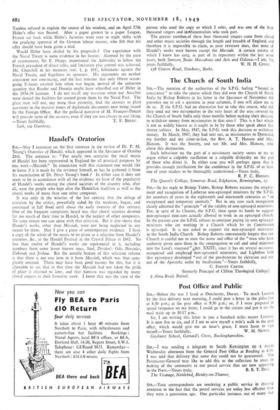The Church of South India
SIR,—The mention of the authorities of the S.P.G. feeling "bound in conscience " to take the course which they did over the Church of South India by Bishop Roberts in his letter in the Spectator of November 4th provokes me to ask a question in your columns, if you will allow me to do so. If the S.P.G. had no alternative but to take this course, why did they send out two missionaries to the very heart of the area covered by the Church of South India only three months before making their decision to withdraw money from missionaries in that area ?' This is a fact which is not as widely known as it ought to be by those who speak about this thorny subject. In May, 1947, the S.P.G. took this decision to withdraw money. In March, 1947, they had sent out, as missionaries to Dormakal, my brother and my sister-in-law, the Rev. A. T. Hanson and Mrs. Hanson. It was the Society, and not Mr. and Mrs. Hanson, who chose this destination.
Such behaviour on the part of a missionary society seems to me to argue either a culpable vacillation or a culpable disloyalty on the part of those who direct it.. In either case you will perhaps agree that it provides enough justification for the confidence in the S.P.G. of at least one of your readers to be thoroughly undermined.—Yours truly,
R. P. C. HANSON. The Queen's College, Somerset Road, Edgbasron, Birmingham, is.
SIR,—In his reply to Bishop Tubbs, Bishop Roberts excuses the employ- ment and recognition of Lutheran non-episcopal ministers by the S.P.G. for numbers of years in the eighteenth and nineteenth centuries as "an exceptional and temporary anomaly." But in any case such recognition clearly admitted the " principle" of the validity of non-episcopal ministries. For, in spite of its Charter, the S.P.G. then spent its funds to support non-episcopal ministers actually allowed to work in an episcopal church. In the present case the S.P.G. refuses to continue paying its own episcopal ministers who are working in a Church which by its Constitution is episcopal. It is not asked to support the non-episcopal ministries in the South India Church Bishop Roberts conveniently forgets that our Church is careful not to state the name and office of the "men who have authority given unto them in the congregation to call and send ministers into the Lord's vineyard ",(Art. XXIII), since it has on several occasions recognised and employed'. non-episcopal ministries, and Lightfoot held that episcopacy developed "out of the presbyterate by elevation and not out of the Apostolic order by localisation."—Yours faithfully,
C. SYDNEY CARTER
(formerly Principal of Clifton Theological College). 2 Alma Road, Bristol.














































































 Previous page
Previous page